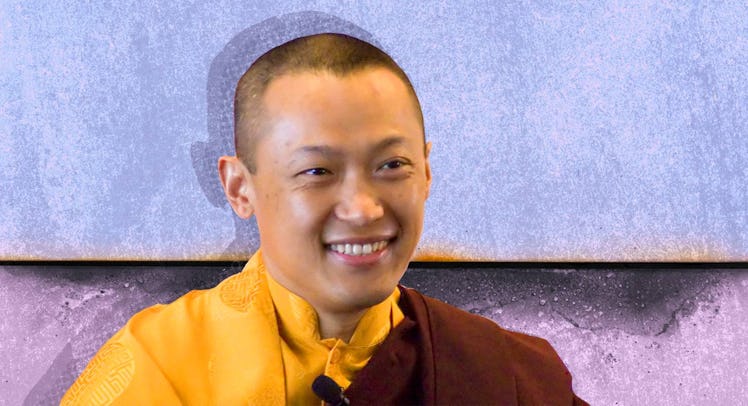Buddhist Leader Sakyong Mipham Rinpoche Takes the Fatherly Questionnaire
The spiritual icon talks about introducing his daughters to meditation and getting ice cream as a family.

Sakyong Mipham Rinpoche is a Buddhist guru and the leader of the Shambhala tradition, a collection of meditation and retreat centers that span the globe. The Sakyong (a compound title meaning “earth protector”) inspires thousands of his students in their spiritual journeys then goes home to help raise his three young daughters, who all go by Jetsun. The son of America’s first major Buddhist leader, Sakyong Mipham Rinpoche has made it his life’s work to help people be at piece and help his daughters find purpose.
Sakyong Mipham Rinpoche took the Fatherly Questionnaire in New York City.
What is your name?
Sakyong Mipham Rinpoche. Mipham is a Tibetan word that means “unconquerable,” it’s sort of a given name. Sakyong is the title I have. “Sa” is Tibetan for Earth. “Kyong” is to protect. So, it means Earth Protector. Rinpoche is a title in Tibetan that is used honorifically for teachers and for people carrying on spiritual traditions.
Age?
54.
Profession?
Teacher, Earth Protector.
How old are your children?
Two and a half, four and a half, and six.
What are their names?
We have the same honorific title for all of them – Jetsun. Jetsun is a Tibetan word that’s honorific in terms of their role as spiritual people.
Are they named after anyone in particular?
Our family descends from a legendary Gesar Ling, who was a great ethereal kind of figure in Tibet. He was a great Tibetan king on my father’s side. And so they’re names that are often associated with his family and his worship.
Do you have any cute nicknames for your children?
They gave each other nicknames. They have different ones. I generally call them Jetsun, and they know which one I’m talking to by the tone.
What do they call you?
Abba, it’s Tibetan for father or daddy.
How often do you see them?
When I’m not traveling, I see them every day and we’re with them. We just went back to Nepal and they were there too visiting with my wife’s side of the family.
Describe yourself as father in three words.
I would say strong and I would say caring and then I would also say patient.
Describe your father in three words.
I would say attentive and spacious.
What would you say your strengths as a father are?
Humor, and trying to be there for them that way.
What are your weaknesses as a father?
I would say giving them space and allowing them to do what they need to do. One of the things I struggle with is trying to control the situation.
What is your favorite activity to do with your children?
Right now what they love to get stuffies, like the little stuffed dolls, and ice cream, in that order. If I come back from a trip, they’ll say, “Can we go get a stuffy?” One of them likes unicorns, and the other one right now likes tigers, and the other one likes rabbits.
What has been the moment you are most proud of as a father?
Recently, we were doing this very long ceremony where you have to sit still for a long time and usually I don’t have them do it, but they all came in and wanted to sit, so it was three to four hours of sitting there. And they would get up and walk around a little bit, but they more or less sat through the whole thing. It’s a Puja way of doing meditation and there was singing and chanting and music being played, but it’s quite intense. And they were able to sort of be in that environment, so we were pretty happy about it.
What heirloom did your father give to you if any?
Quite a few. Different ritual items, his statues. He gave me a very ancient text on philosophy that I hold very dearly.
What heirloom do you want to leave for your children?
Shambhala. We call it enlightened society, how you can live communally. And that seems to be the most precious thing.
Describe the dad special for dinner.
We usually make Momos, which is a Tibetan dish. They’re like dumplings. So they love Momos.
Are you religious, and are you raising your children in that tradition?
I’m not sure if I would call it religious, but that would be a yes.
What’s a mistake you made growing up that you don’t want your kids to make?
It’s important to start early in terms of what they’re doing. Because the more you get used to it, the better.
Besides saying it how do you let your children know that you love them?
I don’t worry about it too much. I feel like it’s more about being there for them.
This article was originally published on